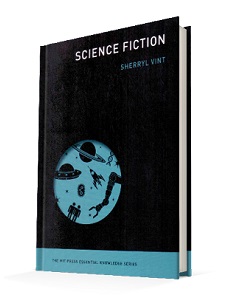As all readers of ROOM will appreciate, there is an undeniable link between science fiction and ‘space’ in all its forms… exploration, development, art, culture, etc. It is for this reason that we have included a review of this little book from the MIT Press “Essential Knowledge” series which, according to the publisher, “offers accessible, concise, beautifully produced pocket-size books on topics of current interest”.
In nine chapters, professor of media and cultural studies Sherryl Vint covers everything from “Robots, AI and Transhumanism” to “Environment, climate change and the Anthropocene” along with futurology, economics, “the colonial imagination” and many other science fiction tropes. The author’s goal throughout is not to provide “a detailed history of the genre nor a comprehensive listing of its most important works” but to focus on “what science fiction can do” and how it can be used “for grasping daily life in industrialized, technological societies”.
Clearly, this is not an analysis of ‘space fiction’ per se, so readers will have to make their own parallels between the wider literary genre of science fiction and the real world of the space sector, industry or profession. There are, however, plenty of mentions of space movies, from Star Trek to Hidden Figures, and real space actors from NASA to Elon Musk. The cultural impact of the Space Shuttle is also covered, but the ‘overview’ nature of the series allows no room for analysis. For example, Vint mentions Star Trek fans’ insistence that the first Orbiter be named Enterprise, but omits the fact that, although NASA listened to the fans, it was a flight-test article not a flight model Shuttle that was named Enterprise, meaning that ‘Shuttle Enterprise’ got nowhere near the space environment.
Overall, there’s very little not to like about this book, in part because it’s not long enough to get bogged down in academic verbosity, but also because it leaves the reader wanting more.











